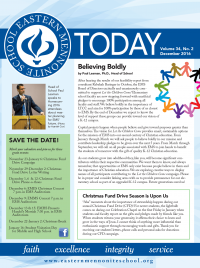EMHS graduate Andrew Ferguson ’05 works in the U.S. Supreme Court, serving as a clerk to Chief Justice Clarence Thomas. Post high school, Andrew earned an undergraduate degree in history and a J.D., both from from the University of Virginia. He recently spoke to the Class of 2017 during their annual Senior Trip to Washington, D.C. Speaking in a Supreme Court confer- ence room, Andrew stated that the single most important thing he learned at his high school alma mater was how to write. He expanded his compliment of the EMHS English Department by telling Seniors that the most important class he had in high school was Term Paper taught by Mr. Ernest Martin.
Martha Bell ’13 was recently recognized for an outstanding essay she wrote during her freshman year of college at Eastern Mennonite University. Martha attended EMS grades 6-12 and learned skills from each English teacher in turn. At EMU, her paper on the mysteries of Chronic Lyme Disease was selected for publication in a nationally used composition textbook. Martha’s mastery of writing began at EMS, and like Martha, countless students have been inspired to write well thanks to master teachers in the EMS English Department.
Curt Stutzman has been teaching English and Bible at EMHS for 21 years and has often heard from graduates who tell him that they are the best writers in their area of study in college. Mr. Stutzman emphasizes that this feat happens not only because of quality instruction, but also because EMS has an emphasis on writing across the curriculum.Teachers of each discipline require quality writing, which prepares students for a lifetime of success in their chosen occupation or profession.
Patsy Seitz, EMS Director of Academics and the current chair of the English Department, indicates that students at EMHS are consistently asked to write papers. “Our students,” Mrs. Seitz states, “don’t blink when asked to write a paper in college.” EMHS students are given multiple opportunities to practice forming an essay. They must use critical thinking skills and learn techniques for revising their writing. In an age when intellectual property is often used and reused without citation, Mrs. Seitz and other English teachers insist that students properly cite and document their materials.
English teacher Mary Cranston teaches a yearlong AP English Literature and Composition class wherein students read, analyze, critique, discuss, and write about poetry, fiction, and drama. Mrs. Cranston requires rigorous reading and writing assignments and brings a great depth of history and literature knowledge to her students. Mrs. Cranston appreciates that English teachers at EMHS are allowed to build their own curriculum, which allows her to teach with excitement, strength, and passion. Mrs. Cranston states that the EMHS English department encourages a “sense of shared professionalism and expertise [that] is very empowering.”
English teacher Ben Roth Shank is working on earning his Master’s degree in English from Valdosta State University. Mr. Roth Shank pushes himself pedagogically and has redesigned both U.S. Literature and English 10 classes. An article that Mr. Roth Shank wrote for English Journal, a publication of the National Council of Teachers of English, will be published in January 2018. If you walk into Mr. Roth Shank’s classroom you will discover students investigating the meaning of words, writing essays, exploring poetry, and reading deeply.
In Middle School, Susan Melendez teaches 6th grade students about different literary forms and the craft of writing. She teaches spelling, vocabulary, grammar, editing, and promotes independent reading. In English 7, Susan Swartz seeks to increase the word power of her students and make them more proficient in reading, writing, speaking, and research strategies. Mrs. Swartz also teaches her seventh graders the rudiments of rhetoric, giving them practice in making speeches. Jodi Hertzler teaches 8th grade students to appreciate quality literature while building their composition skills, vocabulary, and their grasp of grammar and syntax.
The foundation for writing well begins in the elementary school, where students are taught to brainstorm, make an outline, construct a beginning and end, and then edit and publish. EMES students practice this procedure over and over at each grade level, becoming more independent writers with each grade level. EMES Principal Maria Archer notes that writing at the elementary level always has a purpose—students are giv- en reasons to write that help motivate them to do their best.
A firm foundation from Kindergarten to Senior year, EMS is proud to graduate students with excellent writing skills like Andrew and Martha. Have writing accolades of your own to share? We’d love to know about them. Email them to today@easternmennonite.org.

